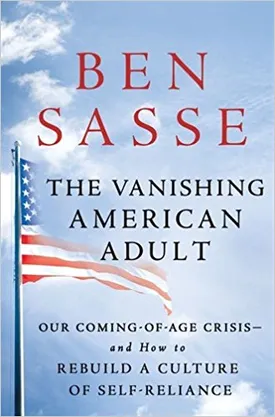The Vanishing American Adult: Our Coming-of-Age Crisis–and How to Rebuild a Culture of Self-Reliance by Ben Sasse
The Vanishing American Adult is a book by Ben Sasse that argues that there is a crisis of our coming-of-age culture in the United States. According to Sasse, this crisis can be traced back to a loss of self-reliance among American adults, a consequence of a society that values convenience, comfort, and ease over hard work and resilience. In Sasse’s book, he explores the causes of the disappearance of American adults and how we can reclaim a culture of self-reliance that can provide a better foundation for a happier and more prosperous society.
Sasse begins the book with a look at the current state of the American public. He argues that there is a crisis of malaise and a lack of ambition in our culture, caused in part by the convenience culture. He claims that the current focus on ease and convenience has made us soft and removed us from our need to rely on ourselves, resulting in an epidemic of helplessness. He then goes on to provide evidence of this phenomenon, citing the decreasing numbers of full-time jobs and the increasing numbers of people living with their parents after turning 18.
Sasse argues that the lack of self-reliance has serious implications. He notes that being reliant on others for assistance in challenging times leads to a lack of resilience and a lack of responsibility. As Sasse points out, our society does not reward hard work, and instead encourages us to rely on others, leading to an increasingly entitled population.
The second half of the book looks at ways to rebuild a culture of self-reliance and independence. Sasse argues that this shift must begin in the home, with parents investing in the development of life skills, such as the ability to budget and manage finances, a sound work ethic, and the competency to think and work independently. He claims that if parents are willing to invest in teaching these skills, the next generation of adults will be better-equipped to handle the challenges of life and become more self-reliant.
In addition to the home, Sasse argues that we need to develop communities that value hard work and responsibility. He suggests that schools could incorporate life skill training, mentorship programs, and alternative literacy requirements that emphasize the importance of self-reliance. Churches, Synagogues and other faith-based communities could also help, Instilling a sense of work ethic and independence.
Overall, Ben Sasse argues that the current culture of convenience has hindered the development of self-reliance among adults in this country and has contributed to a crisis in our coming-of-age culture. He provides evidence of this phenomenon and offers solutions for how to rebuild a culture that emphasizes hard work, resilience, and personal responsibility. He encourages parents to invest in their children’s development, schools to incorporate life skills into their curriculums, and faith-based communities to offer mentorship programs specifically to address the crisis of coming-of-age in America. It is a book that offers a thought-provoking and inspiring look at our current state of affairs and is worth a read for anyone who wants to take steps to rebuild a culture of self-reliance.

